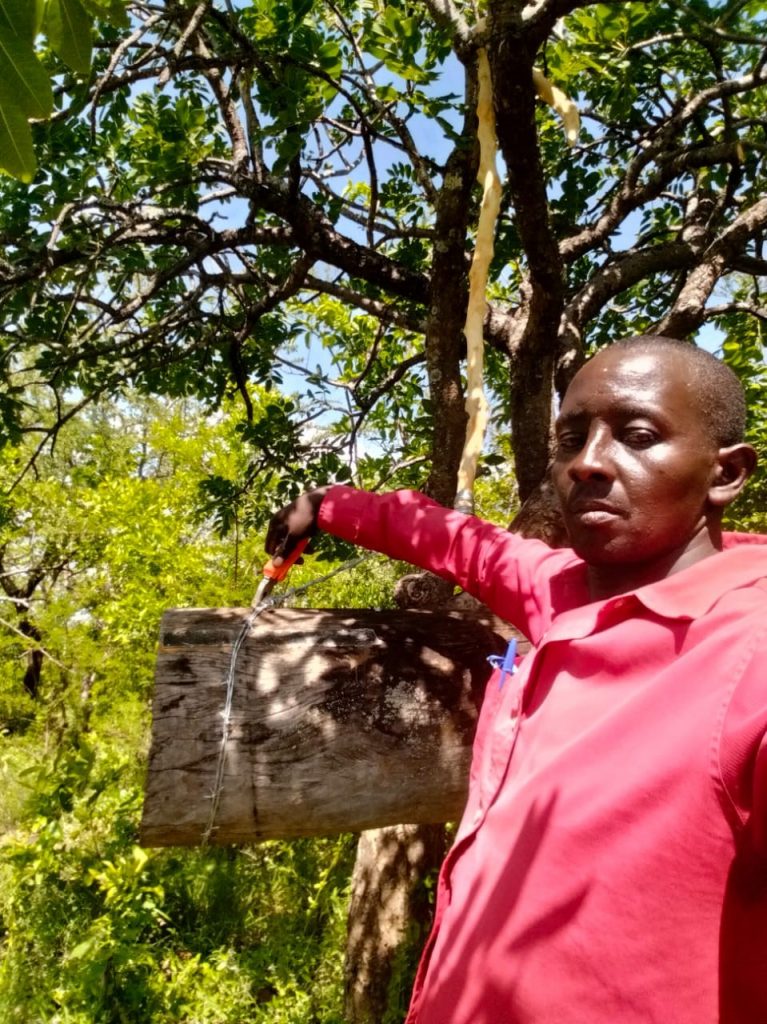Kenya is far from fully exploiting her potentials in beekeeping because local farmers largely practice small scale holdings mainly for consumption within the family household.
Although the country has the potential to produce at least 100,000 metric tonnes of honey annually beekeepers have only managed a paltry 20 percent of the projected amount because majority of farmers still rely on the traditional log hives.
However a group of youthful Beekeepers from Kivaa, in Masinga Constituency, Machakos County, have embarked on mission to break away from the traditional norm by adopting modern farming methods to make the venture commercial and profitable.
The ten member youth group seeking to bridge the gap have commercialised bee farming into a lucrative income-generating venture to the admiration of the local community that only practice the farming on subsistence basis
The Akamba Cultural Youth Group who form part of the larger Via-Mweki Community-Based Organisation (CBO), have taken a lead role in mentoring and educating unemployed youth on how to earn a living through beekeeping ventures after finishing secondary school and colleges while waiting for other opportunities in the elusive job market.
Speaking to KNA, Jairus Kioko, a lead member of the group, said although bee farming was yet to gain traction among the youthful population who wanted a quick fix to their financial challenges it however offered a viable alternative to supplement other income generating activities as it was neither labour intensive nor time-consuming.
He explained that initially, many young people in the group thought that beekeeping required significant investment and time but after training on proper beekeeping techniques, they realized it was possible to supplement the farming with othre activities.

“Beekeeping for us has become like a hobby as it doesn’t take up a large amount of time compared to other farming activities. We have organized ourselves so that we only need to commit to visiting our hives once a week, and we are mainly busy during harvesting,” Kioko added.
Kioko acknowledged that when they started, they lacked knowledge, but with support from the Institute for Culture and Ecology (ICE), which provided training and hives, they have been able to increase production and even attract other youths in the area to venture into the business.
“Beekeeping has provided employment opportunities for many young people in my areas. Many youths who were idle and hopeless, often turning to illicit brews at the shopping centre, have now embraced beekeeping as an economic activity,” he said.
He also noted that beekeeping is a climate-smart farming activity promoted by Via-Mweki, as it supports farmers through pollination, which boosts crop yields and food availability.
“Bees (‘nzuki’ as the Akamba call them) provide essential ecosystem services, supporting biodiversity, improving crop yields, and helping communities safeguard the environment,” he added.
Kioko said that during a good harvest in October, they can collect up to 15 kilogrammes of honey from one hive. With a total of 20 hives, they make substantial income.
“We sell the unprocessed honey for KES 500 per kilogramme, while the finished product fetches KES 800 per kilogramme. With each hive producing between 11 and 15 kilogrammes, we generate good profits, which we share among ourselves. We also set aside some profits for sustainability and expansion,” he explained.
Land, Kioko noted, had initially been a challenge, but through the Via-Mweki group, the youth, including both young men and women, have been practising beekeeping at Kivaa Hills, where they also engage in tree planting.
Honey holds cultural significance for the Akamba community and is used in religious rituals. Raw honey is often offered to the spirits of ancestors (aiimu) when asking for rain.
ICE Executive Director Martin Muriuki said they have been supporting communities through training to conserve forests and hills and by encouraging community-driven protection and rehabilitation of sacred sites.
“We have been working through the African Biodiversity Network (ABN), a network of organizations and individuals across Africa, to motivate communities to undertake conservation initiatives despite myriad challenges,” he explained.
For the young members of Kivaa’s Akamba Cultural Youth Group, the sky is the limit. With the knowledge and initial support they have received, they aim to increase the number of group members and hives, ultimately establishing a fully functional and registered honey company to supply both local and export markets.
Kioko emphasized that the youth are well-positioned to address the gaps in Kenya’s beekeeping sector.
According to a report by the Kenya Agricultural and Livestock Research Organization (KALRO), the country. produces about 11,000 metric tonnes of honey and 1 to 3 tonnes of beeswax annually.

This, the report indicates, represents only about 20 per cent of Kenya’s potential, with low production attributed to inappropriate technologies, poor beekeeping practices, and the limited uptake of improved techniques.
This year, World Bee Day, commemorated in May, highlighted the youth’s role in addressing challenges faced by bees and other pollinators.
Under the theme “Bee Engaged with Youth”, the event underscored the importance of investing in youth-led beekeeping initiatives to accelerate innovation, creativity, and technological advancements.
Beekeeping, or apiculture, is an important value chain in Kenya, generating about KES 4.5 billion annually. While the country produces approximately 14,000 metric tonnes of honey and 140 tonnes of beeswax, the potential stands at 100,000 metric tonnes of honey and 1,000 tonnes of beeswax.
By Wangare Ndirangu


